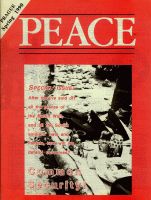
Peace Magazine Aug-Sep 1990, page 5. Some rights reserved.
Search for other articles by various here
The construction of Candu nuclear reactors in Romania has been scandalized by gross safety violations and sub-standard construction by forced laborers living in cardboard residences. This multi-billion dollar project was paid for by massive food exports which contributed to Romania's rising rates of infant mortality.
Lt.-Gen Ion Pacepa, former head of Romania's foreign intelligence agency until his defection in 1978, revealed that Ceausescu's ambition to possess nuclear weapons arose during the mid197Os when negotiations for Canada's reactors had been well-developed. Knowing that Pakistan's dictator, Ali Bhutto, was worried about India's 1974 nuclear explosion (thanks to Canada's loose nuclear technology transfer) Ceausescu provided Candu blueprints and arranged for a clandestine trade in nuclear weapons know-how.
In a 1984 BBC interview Ceausescu said, "if we wanted to manufacture a nuclear weapon today, we could do so." Two years later, Romania diverted 12.5 tonnes of Norwegian heavy water to India, in violation of the Non-Proliferation Treaty. Romanians told Norway it was needed for their Candus.
As Romania's persecution of its Hungarian minority escalated, refugees fled to Hungary. This led to occasional exchanges of small arms fire and a major incident in 1988, when Romanians crossed the border with artillery fire. Soviet armored units intervened, forcing the Romanians to withdraw. To cool matters, Hungarian dictator Karoly Grosz met with Ceausescu, who boasted belligerently that "Romania already has such a strong industry that it is able to make any kind of weapon." Because he believed two Candus would be on line in 1988 and a third in 1989, he felt that the necessary ingredients (heavy water, plutonium, tritium, etc) to manufacture nuclear weapons were imminent.
In April 1989, Ceausescu, at the Council for the Socialist Democracy and Unity Front, officially announced Romania's readiness to produce nuclear weapons. Three months later at a WTO summit, while the Romanian Army Chief of Staff made territorial claims on Hungary, other high level officials threatened Hungary with nukes and announced that medium range missiles were being manufactured.
In response to inquiries by MP Dan Heap, External Mfairs Minister Joe Clark claimed on Nov 27, 1989 that "Romania has not abrogated the terms
(of) its full-scope safeguards agreement with the International Atomic Energy Agency (IAEA)." Clark added on Jan 22, 1990 that his "remarks were based upon information we receive regularly from the IAEA..."
IAEA is responsible for monitoring the export of heavy water. The diversion to India by Romania shows that its "full-scope safeguards" need review.
The Romanian Army's officer class are complicitous in nuclear threats and territorial claims against Hungary. Canada should order renunciations from them. The new Romanian government should explicitly declare that its nuclear weapons intentions were buried with Ceausescu.
Wally Keeler, Cobourg, Ont.
The last United Nations General Assembly declared 1990 to 1999 the Decade of International law.
The Decade aims to promote the International Court of Justice (ICJ), and to encourage the further development and codification of international law. The program of activities is to be determined at the next General Assembly. The resolution began as an Initiative of the Movement of Nonaligned Countries, 102 nations that includes most countries that are not members of NATO or the Warsaw Pact.
Their foreign ministers met in June, 1989 and proposed a peace conference at the end of the Decade.
The Non-Aligned countries in the past have typically been skeptical about international law, seeing it as the creation of the big powers. Fewer than a quarter of the Non-Aligned recognize the jurisdiction of the ICJ. This resolution shows that they now recognize that the rule of law can also help protect the smaller states. Indeed, preliminary drafts of their proposal included plans to work toward universal acceptance of the compulsory jurisdiction of the ICJ, as many of the ministers mentioned in connection with the Decade.
While generally welcoming the idea of a U.N. Decade of International law, Western countries weakened the strong Non-Aligned proposal before adopting the idea. The U.S. objected to specific language in the declaration linking disarmament and the New International Economic Order in the Decade. Whether the original aspirations for the Decade are realized depends in large measure on the program for the Decade that governments adopt at the next U.N. General Assembly. Canadians should support concrete government actions, such as negotiations, rather than symbolic gestures.
Dieter Heinrich

Peace Magazine Aug-Sep 1990, page 5. Some rights reserved.
Search for other articles by various here